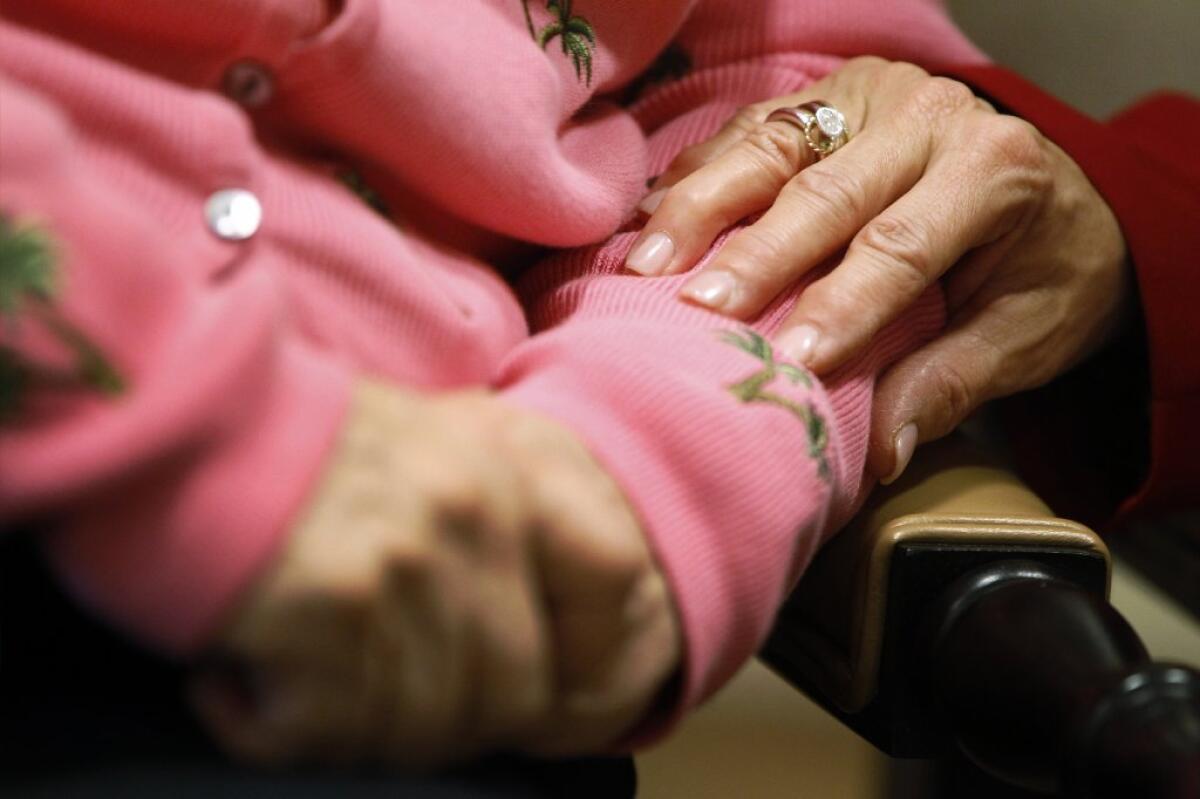Two proposed Alzheimer’s drugs show disappointing results

Two biological therapies designed to improve the clearance of sticky plaques from the brains of those with Alzheimer’s disease have failed to slow the steady loss of cognitive function in patients with mild to moderate forms of the degenerative disorder.
In late clinical-trial findings published Wednesday in the New England Journal of Medicine, the monoclonal antibodies known as solanezumab and bapineuzumab were shown ineffective at changing the downward cognitive trajectory of Alzheimer’s patients.
Both solanezumab and bapineuzumab are bioengineered medications that bind to beta-amyloid deposits in the brain and promote their removal. After promising early trials, both therapies were thought to be headed to the Food and Drug Administration for evaluation as treatments for Alzheimer’s.
That changed after the preliminary results of these newly published trials were made public in 2012. Pfizer and Johnson & Johnson, the companies sponsoring the development of bapineuzumab, abandoned further efforts to prepare the medication for market.
But Eli Lilly, the pharmaceutical firm developing solanezumab, was not so discouraged. The company has launched a new and larger trial of the therapy, but shifted its focus to people newly diagnosed with mild Alzheimer’s. In dissecting the data yielded by the trial published Wednesday, Lilly found evidence that subjects whose Alzheimer’s symptoms were just becoming evident may have benefited from solanezumab. The pharmaceutical giant hopes that a larger trial of those with the early stages of the disease will bear that hope out.
Dr. Paul Aisen, a UC San Diego Alzheimer’s researcher who was a co-author of the study on solanezumab, said that while the results of both studies were disappointing, they did shed some light on what it will take to change the course of Alzheimer’s in patients.
The bapineuzumab study, Aisen said, indicates that modestly reducing amyloid plaques in those with established disease is not sufficient to translate into cognitive effects. The trials of solanezumab offer hints that with early intervention, the treatment might help.
“Overall, I think these studies suggest that anti-amyloid interventions may need to be administered early in the disease,” Aisen said.
Dean M. Hartley, director of science initiatives at the Alzheimer’s Assn., said studies like these offer important clues to possible treatments. The details of the newly published studies may prompt Alzheimer’s researchers to reevaluate the relationship between beta-amyloid and the protein tau, found plentifully in those with established Alzheimer’s disease but less so in those with early disease, Hartley said. And they will provide insight into why some treatment approaches may help prevent Alzheimer’s but cannot stop its progression once it is established.
“We’re thinking about prevention for the first time,” said Hartley, who noted that federal funding for research -- boosted by $100 million last week in an Obama administration initiative -- is crucial.
Bapineuzumab was the subject of two separate clinical trials. One compared the therapy’s effectiveness with that of a placebo in Alzheimer’s patients who carry a genetic variation predisposing them to the disease. The second tested bapineuzumab in Alzheimer’s patients without that genetic risk factor. After 78 weeks of receiving intravenous infusions every 13 weeks, subjects who got bapineuzumab were no less impaired than those who got infusions of a placebo.
Among carriers of the ApoE 4 allele (those at greater genetic risk of developing Alzheimer’s), those who got bapineuzimab showed lower levels than did those who got placebo of the protein tau -- a telltale sign of neurdegeneration -- in their cerebrospinal fluid. But there was no overall difference in the two groups’ impairment after 78 weeks.
In a larger clinical trial to determine whether solanezumab might benefit patients in the earliest stages of Alzheimer’s, USC Alzheimer’s researcher Dr. Lon Schneider cautioned that results are likely to be modest. Pointing to the results in the newly published solanezumab trial that have prompted the new trial, Schneider noted that “these are not big effects.”
“I hope it’s positive, but it’s most likely to have a modest effect,” said Schneider, who was not involved with either of the current studies.
At the same time, Schneider said, the failure of both therapies “is not a nail in the coffin” of treatment approaches that aim to alter the course of Alzheimer’s by targeting the buildup of beta-amyloid plaque in the brain. These antibodies have failed to deliver clinical improvements, he said, but several other ways of combating the buildup of beta-amyloid, including vaccines that prompt the body to produce its own antibodies to beta-amyloid and drugs that attack precursors to the protein, are being tested in clinical trials.
“The studies are what they are,” Schneider said. “They show disappointing results. But there’s a good amount to learn from them.”







